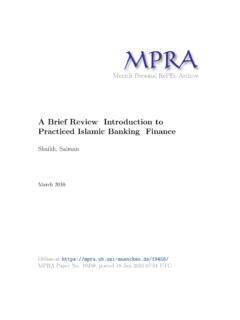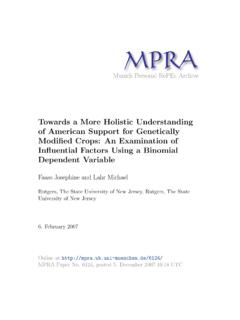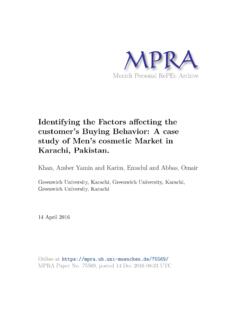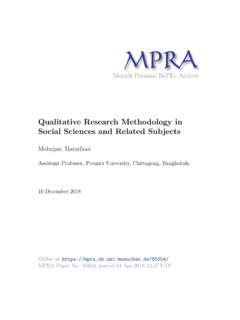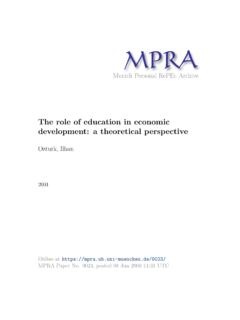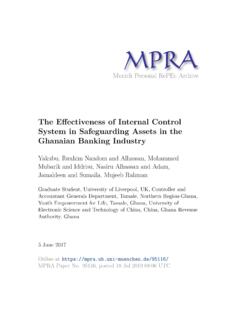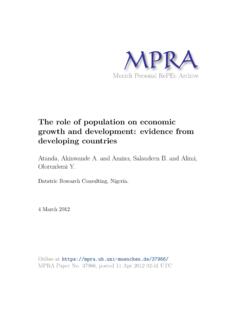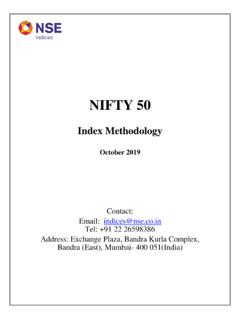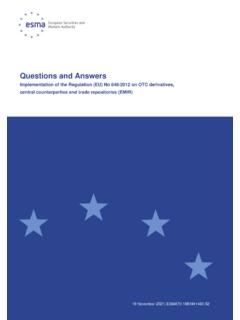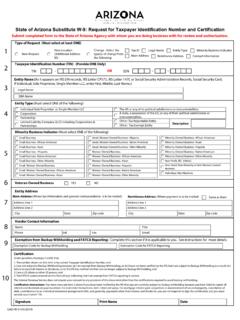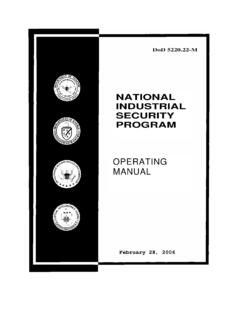Transcription of Risk Management Theory: A comprehensive empirical ... - …
1 Munich Personal RePEc ArchiveRisk Management theory : Acomprehensive empirical assessmentKlimczak, Karol MarekLeon Kozminski Academy of Enterpreneurship and Management23 July 2007 Online Paper No. 4241, posted 24 Jul 2007 UTCRisk Management Theory1 Running head: RISK Management THEORYRisk Management theory : a comprehensive empirical assessmentWorking PaperKarol Marek KlimczakLeon Kozminski Academy of Entrepreneurship and Management in Warsaw, PolandKarol Marek Klimczak, (48 22) 519-21-69, (48 22) 519-21-93 Fax: (48 22) 519-23-09 Leon Kozminski Academy of Entrepreneurship and Management ul. Jagiellonska 57/5903-301 WarsawPolandRisk Management Theory2 AbstractThe aim of this paper is to develop a methodology for thorough empirical testing of major contemporary corporate risk Management theories: financial theory , agency theory , stakeholder theory and new institutional economics.
2 Unlike in previous research, the tests are organised around theories, rather than individual hypotheses. I used a number of tests for robustness and subjected hypotheses to repeated testing, cross-verifying results. Evidence of tests conducted on a sample of 150 companies listed at the Warsaw Stock Exchange in Poland, covering years from 2001 to 2005, clearly point to low empirical verification of all theories considered. However, I find evidence for some theoretical determinants: currency exposure, market-to-book value, IT and service sectors and size. In conclusion I suggest implications for future empirical and conceptual research. Keywords: corporate risk Management , hedging, derivatives , CARTRisk Management Theory3 Risk Management theory : a comprehensive empirical assessmentWorking PaperThere have been many empirical studies aiming at finding support for the various theories of corporate financial risk Management .
3 However, subsequent research papers failed to determine which theories are supported by the data and which are not. In consequence both theoretical research efforts and the design of applied methods for corporate risk Management are stalled by the inability to decide which theoretical approach to follow. After a spate of new research in this field in the late 90's there have been few studies that added to our understanding of corporate hedging behaviour. Incidentally, most valuable pieces of research in recent years concentrated on methodological issues: the endogeneity problem (Jin and Jorion, 2006), inclusion of non-derivative hedging (Davies et al., 2006; Judge, 2006), and assumptions about the purpose of derivative use (Faulkender, 2005).
4 In this paper I follow the methodological strain of research and propose verification of risk Management theory which is focused not on individual hypotheses but on theories. I also attempt to provide strong evidence as to the verification status of these theories by using a number of methods and subjecting hypotheses to repeated testing. This paper aims to design and conduct an exhaustive empirical investigation into all major corporate risk Management theories, which would provide strong statement of their verification status. The theories considered include risk Management models developed within the body of the following theories of the firm: financial theory , agency theory , stakeholder theory and new institutional economics.
5 Consequently, while most research papers present the hypotheses in sections concentrated around particular determinants of risk Management , I discuss them in the order of theories from which they originated. Risk Management Theory4 The inclusion of new institutional economics and stakeholder theory , none of which has been tested in the context of risk Management , is the first attempt to introduce these theories to empirical research in the field. Both theories are relatively new and immature. However, since they offer a new perspective on the problem of hedging, it is worthwhile to consider them. Another contribution of this paper is a cohesive testing methodology. First of all, I designed a set of hypotheses basing on previous research.
6 Secondly, despite using a new approach to empirical verification, I strived to maintain comparability with previous studies in terms of hypotheses and statistical methods. Thirdly, I tested hypotheses using a wide range of statistical methods, with repeated testing of the same hypothesis, which provided double verification of results. These issues are discussed in the section on methodology below. The choice of data also provides a new insight into risk Management practices of companies. The dataset for this study comprises annual report data for 150 Polish listed companies, in the period of 2001-2005. Few studies of economic theories are carried out using emerging market data.
7 In the period examined Polish companies had ready access to derivatives and were subject to International Accounting Standard 32 and 39 regulation. However only 30% used hedging, far fewer than in developed European or overseas markets. It is therefore interesting to investigate this new market and check if research results match those from different and previous researchFinancial economics approachFinancial economics approach to corporate risk Management has so far been the most prolific in terms of both theoretical model extensions and empirical research. This approach builds upon classic Modigliani-Miller paradigm (Miller and Modigliani, 1958) which states Risk Management Theory5conditions for irrelevance of financial structure for corporate value.
8 This paradigm was later extended to the field of risk Management . This approach stipulates also that hedging leads to lower volatility of cash flow and therefore lower volatility of firm value. Rationales for corporate risk Management were deduced from the irrelevance conditions and included: higher debt capacity (Miller and Modigliani, 1963), progressive tax rates, lower expected costs of bankruptcy (Smith and Stulz, 1985), securing internal financing (Froot et al., 1993), information asymmetries (Geczy et al., 1997) and comparative advantage in information (Stulz, 1996). The ultimate result of hedging, if it indeed is beneficial to the firm, should be higher value a hedging premium.
9 Evidence to support the predictions of financial economics theory approach to risk Management is poor. Although risk Management does lead to lower variability of corporate value ( Jin and Jorion, 2006), which is the main prerequisite for all other effects, there seems to be little proof of this being linked with benefits specified by the theory . One of the most widely cited papers by Tufano (1996) finds no evidence to support financial hypotheses, and concentrates on the influence of managerial preferences instead. On the other hand, the higher debt capacity hypothesis seems to be verified positively, as shown by Faff and Nguyen (2002), Graham and Rogers (2002) and Guay (1999).
10 Internal financing hypothesis was positively verified by Guay (1999) and Geczy et al. (1997), while it was rejected by Faff and Guyen (2002) and Mian (1996). Judge (2006) found evidence in support of financial distress hypothesis. Tax hypothesis was verified positively by Nance, Smith and Smithson (1993), while other studies verified it negatively (Mian, 1996 ; Graham and Rogers, 2002). More recently Jin and Jorion (2006) provide strong evidence of lack of value relevance of hedging, although some previous studies have identified a hedging premium (Allayannis and Weston, 2001, Carter et al., 2006). Risk Management Theory6 The hypotheses tested in this study include all of the above rationales, except for information asymmetries and comparative information advantage.
